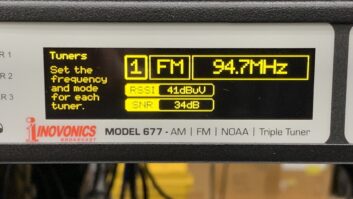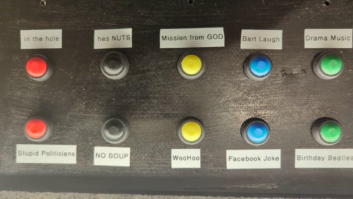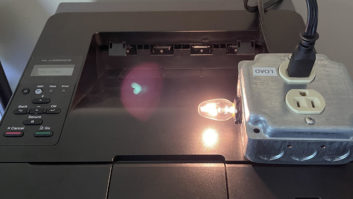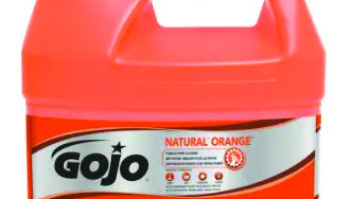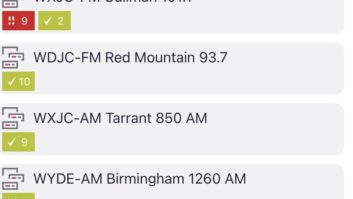With remote season about to shift into high gear, Bill Draper, chief engineer for Clear Channel Media in Poughkeepsie, N.Y., offers a tip to keep cables organized.
Yes, you can wind up a cord as shown in Fig. 1; but it can still kink up. One good approach is the Rip-Tie Velcro hook-and-loop cable fastener, seen in Fig. 2. Or, as shown in Fig. 3, Bill suggests an economical alternative. Home Depot sells a 75-inch roll of Velcro brand Plant Ties, with mating fastening material on either side, for under $10. (If you are shopping out of gardening season and you can’t find them at the store, search Amazon.com. Or look for Velcro One-Wrap straps, which are sold year-round at Home Depot.)

Fig. 1: Put an end to kinked power and mic cables.

Fig. 2: The Rip-Tie has a cloth flap that makes unrolling cables easier.
To secure cables or extension cords, simply cut off a short length and wrap it around the cable bundle. If the tie gets lost or damaged, simply snip off another piece. Use Bill’s solution to prevent your cables from knotting themselves into a twist when you’re not looking.
Reach Bill Draper at billdraper@clearchannel.com.

Fig. 3: You can use Velcro One-Wrap straps to secure remote cables.

Fig. 4: FEMA’s Ready Emergency Supply List is free.
* * *
To make finding things easier for you, each issue of Radio World now has an associated “links page” on our website. In future, when we have a link to share, we will just point you to that issue’s “links page” to find it. You need not copy out long URLs with your paper copy spread out over your keyboard.
For example, all the websites mentioned in this column and throughout this issue can be found at radioworld.com/Mar-14-2012.
* * *
Sheri Babb is customer service representative for RSI, “the RF safety specialists.” The company will be presenting two sessions of its RF safety course in Pearl River, N.Y. on April 5. RSI schedules courses — which qualify for SBE Recertification Credit — throughout the United States.
Can’t travel to New York? RSI offers a variety of courses online through a Virtual University. You can preview classes by visiting the Workbench section of our links page at radioworld.com/Mar-14-2012.
The topics are interesting. In addition to the basic safety course, there are courses about biohazards at the RF site, antennas, electrical safety and AM antennas and detuning. RSI offers customized on-site classes, too. These are ideal for SBE gatherings or state shows.
* * *
Remember, your remote transmitter site and even your studio location should be ready for natural disasters.
Stu Wright is the morning personality at WORG(FM) in Orangeburg, S.C. In broadcasting since 1968, Stu has experienced more than a couple emergencies. He offers additions to the list of emergency items started by contract engineer Ihor Slabicky in Workbench in January.
Stu recommends a small refrigerator to keep water, soft drinks and cheese cold. Sealed blocks of cheese have a long refrigerated shelf life and can provide nourishment.
Find dorm-size refrigerators in the classifieds or, if you live near a college, drive by the dorms at the end of a semester. You’ll be amazed at what students throw out when faced with lugging all their room contents back home.
Stu suggests you have at least one can of wasp spray, the kind with the cone-shaped nozzle for accuracy.
Ihor mentioned toilet paper and paper towels, kept in resealable bags. Stu also suggests sealed boxes of pre-moistened baby wipes. These can be handy when your water supply is precious.
Remember that old saying “It’s better to have something and not need it, than need it and not have it.” In addition to cheese, stock up on foodstuffs, again in plastic bags. If you save cans of food, don’t forget a can opener and cutlery. Slim Jim meat sticks are a good addition, as are chocolate and hard candy.
A well-stocked first aid kit is a priority. Add a dust mask, insect bite ointment and rubbing alcohol to the contents.
If you have a survival kit in your vehicle, add a compass and a coach’s whistle for signaling. Don’t forget pen, paper and a sealable sandwich bag. Should you need to leave a note in an emergency, the baggie will protect the paper. A roll of duct tape will let you affix the baggie where it is visible.
You may find other ideas by browsing a surplus or camping supply store like REI. We hope you never have to use any of this. But preparation is your best line of defense.
* * *
FEMA has put together an emergency supply list in the form of a small tri-fold brochure. The list is free, as are other useful FEMA publications. You can order up to 500 “Ready Emergency Supply Lists” at no charge, using the FEMA Publications order form. The link to the form is saved for you at radioworld.com/Mar-14-2012. Select publication 9-0659 on the form.
Pass the brochures out to folks at your remote events, particularly if you are in an area of the country where natural disasters are a concern. It really helps tie the station to the community. The price is right — and your initiative actually may save a life.
Contribute to Workbench. You’ll help your fellow engineers, and qualify for SBE recertification credit. Send Workbench tips to johnpbisset@gmail.com. Fax to (603) 472-4944.
Author John Bisset has spent 43 years in the broadcasting industry and is still learning. He is SBE Certified and is a past recipient of the SBE’s Educator of the Year Award.

